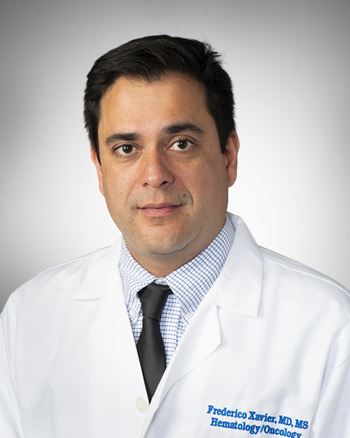Password Reset
Forgot your password? Enter the email address you used to create your account to initiate a password reset.
Forgot your password? Enter the email address you used to create your account to initiate a password reset.
5 Minutes
Frederico Xavier, MD, MS, joined the UPMC Children’s Hospital of Pittsburgh Division of Pediatric Hematology/Oncology as assistant professor of pediatrics in July 2017. He is also an associate director at the Hemophilia Center of Western Pennsylvania.
Dr. Xavier completed both his medical school and pediatric residency at the University of Campinas, São Paulo, Brazil, in 1997 and 2001, respectively. Dr. Xavier then completed a fellowship in pediatric hematology/oncology at the Federal University of São Paulo, Brazil, followed by a pediatric residency at Long Island College Hospital in Brooklyn, New York, and at the Schneider Children’s Hospital, Long Island Jewish North Shore Program in Hyde Park, New York.
Dr. Xavier performed his pediatric hematology/oncology fellowship at both the St. Jude Children’s Hospital, Memphis, Tennessee, and the Hospital for Sick Children, Toronto, Ontario, Canada, in 2011. His Master’s degree in clinical research was obtained from the Indiana Hospital in Purdue University in 2014. Prior to his arrival at UPMC Children’s Hospital, he held appointments as assistant professor of pediatrics and director of thrombosis and hemostasis at the Penn State Hershey Children’s Hospital.

As a member of the growing Pediatric Hemophilia and Hemostasis and Thrombosis Programs at UPMC Children’s, Dr. Xavier’s clinical work focuses on the diagnosis and treatment of acquired and congenital bleeding and clotting disorders in children. “We have an expanding program at UPMC Children’s with much investment devoted to becoming a national and international leader in pediatric hemostasis. This is one of the things that attracted me to join the program, along with the caliber of scientists and clinicians already here — Cheryl Hillery, Jake Cooper, Margaret Ragni, and the rest of the faculty are world-class researchers focused on expanding both our clinicalcare and basic science programs,” says Dr. Xavier.
One of Dr. Xavier’s clinical interests is in joint health in patients with hemophilia, and he is actively working on developing new protocols in terms of imaging, collaborating with colleagues in the Department of Radiology on MRI protocols. He also is undertaking training in ultrasound for use in surveillance of injured or surgically repaired joints in children who have hemophilia.
Transitionary care for children with hemophilia and other bleeding or clotting disorders as they age is of critical importance. Comprehensive care requirements for these conditions extend to everything from primary care to surgical care, even dental care. Patients must understand the various aspects of their disease and adapt to these changes over time, as they age, and become more responsible for their own health care needs and goals. “Our aim is to provide the most comprehensive care possible. This approach extends to patient education and the transitionary care process to ensure patients and their primary care providers are supported by our multidisciplinary teams who are experts in managing the complex and varied needs of bleeding and clotting disorders,” says Dr. Xavier.
As associate director of the Hemophilia Center of Western Pennsylvania, a state and federally funded program that provides treatment, support, and clinical trials participation for both patients and families of adults and children with hemophilia and other bleeding and clotting conditions, Dr. Xavier is responsible for patient care and various aspects of research and ongoing clinical trials.
With respect to research, Dr. Xavier and the Hemostasis and Thrombosis Program are currently involved in several clinical trials, including Kids-DOTT, a randomized international prospective study assessing the safety of a short duration anticoagulation course in provoked pediatric thrombosis and an observational industry-based study using non-factor medications in patients with hemophilia. “It is a groundbreaking time in pediatric hemostasis and UPMC Children’s is part of it,” says Dr. Xavier.
The UPMC Children’s program also is part of a national taskforce working to identify risk factors for the development of thrombosis in children and create a prevention protocol that can be used to guide physicians. “If, as an adult, you are admitted for a knee replacement or other surgery, guidelines are in place to mitigate clot formation. For pediatric patients, we have yet to develop a standard protocol, so this taskforce is actively working to develop these guidelines.”
Several other initiatives Dr. Xavier has joined since his arrival include participation in the Pharmacy Department Anticoagulation Committee, and the ECMO team’s Anticoagulation Taskforce. Within the Division of Pediatric Hematology/Oncology, Dr. Xavier and counterparts, through the Coagulation Committee, have undertaken the process of reviewing educational materials distributed for both inpatient and outpatient settings as part of a broader initiative at UPMC Children’s related to patient education materials.
For further information about Dr. Xavier’s past research, please see the following published papers.